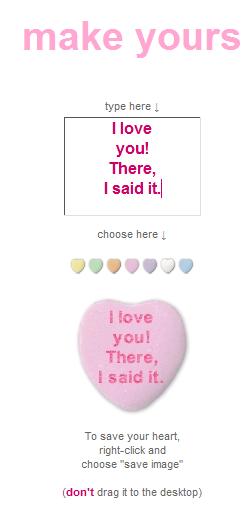
On Valentine’s Day, millions of people will exchange cards and candy hearts with messages of love and affection.
A Wall Street Journal article this week spoke of the challenges some feel saying “I love you,” including this couple:
Lillian Cauldwell often tells her husband of 22 years that she loves him. He replies, “Likewise,” “Ditto,” or “Me, too.” “I know he loves me,” says Ms. Cauldwell, 59, the owner of an Internet talk-radio station in Ann Arbor, Mich. “When I grew up, there simply weren’t any statements of things like that in our family,” says her husband, Barry, 66, a business consultant.
That broke my heart. The notion of a wife never hearing her husband say he loves her feels awful to me because thankfully I have a husband with no reservation about showing affection.
But the article wasn’t just about declaring your love for your significant other. It was also about friends, including men using the L word with their male friends.
Now this is interesting. It might be risky to be the first to say “I love you” in a romantic context, but it’s generally expected that at some point, it’ll probably happen, right? But in friendships, you might be close to someone for decades and never say out loud what you’re feeling. Elizabeth Bernstein wrote in the WSJ article:
How is it that we find a way to ask a boss for a raise or tell a spouse we hate their outfit, but we end up tongue-tied when we try to say “I love you” to the people who matter most to us? We have no trouble saying this to a pet. And we talk about how much we love our possessions—houses, cars, clothes—without thinking twice.
John has some long-time friends who routinely tell him and me that they love us. It’s nice. It’s like family. But I admit I’m still reluctant to tell other friends I love them if they haven’t said it first. What if there’s that awkward silence while they decide if they should say it back?
And what about our coworkers? Do you ever tell your coworkers you love them? Not the ones who vex you, but the ones who you’re really close to, who make your job enjoyable?
Another Wall Street Journal article addressed celebrating Valentine’s Day with “office spouses” — platonic opposite-sex friends you might spend more waking hours with than your actual spouse.
Nearly two-thirds of workers have or have had a work spouse, according to a survey in July of 640 white-collar workers by Captivate Network, a Chelmsford, Mass., digital-programming and advertising company.
Still, the greeting-card industry is not touching the office-spouse relationship. Valentine’s Day is universally regarded as “an occasion for spouses or romantic partners to express their love,” said Susan January, vice president of the Greeting Card Association, a White Plains, N.Y.-based trade group.
There is also an easy route for office spouses, the one chosen by Megan Stuke. She readily jokes that she has two husbands — one at home and a work husband at the hospital where she is employed as an administrator. “It’s important to have someone to bond with at work,” she said.
This could get really complicated. You have a coworker you’re close to and you want to acknowledge it — but this person is the opposite sex, one or both of you are married to other people and you don’t want to move the relationship into romantic territory or make a work relationship awkward.
But it seems to me all tangled up in that comfort with telling friends we love them. If we were all more socially comfortable with saying “I love you” to our spouses, our parents, our siblings and our besties, it would probably feel less fraught to tell a coworker who makes your life better that you love him or her. It wouldn’t mean you were trying to sleep with him, just that you’re grateful for his friendship.
So here’s my challenge to you: think of one person you love who you’ve never said “I love you” to. Use Valentine’s Day as your excuse to say it. Not “luv ya” or some other watered down version, but a genuine “I love you.”
In case you need a little help, here are some links for electronic cards to get you started:

